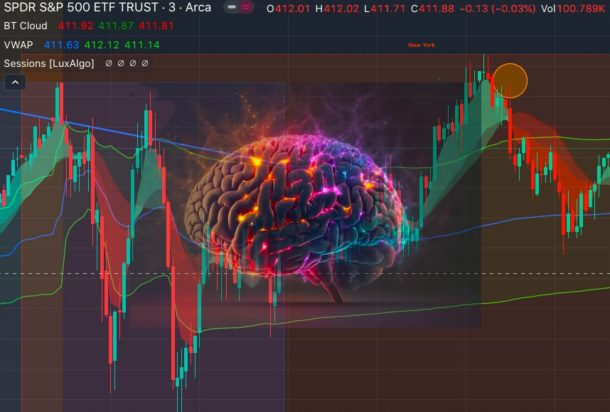"Trading in the Zone" is a book by Mark Douglas that aims to help traders develop a trading mindset that will enable them to trade profitably and consistently. The book explores the psychological aspects of trading, arguing that traders need to focus on their mindset and develop a disciplined approach to trading in order to be successful.
What is Trading Psychology?
Trading psychology refers to the mental and emotional aspects of trading, and how they affect a trader’s decision-making process. It is a crucial element in the world of trading, as it can determine the difference between success and failure. In this post we will discuss the importance, benefits, pros, and cons of trading psychology and do a review of 'Trading in the Zone' while including some of his strategies for improving disciplined trading.

Importance of Trading Psychology
Trading is a highly emotional activity, and it can be challenging to manage these emotions. Fear, greed, and overconfidence are some of the common emotions that traders experience when they are trading. These emotions can lead to poor decision-making, which can result in significant losses.
Trading psychology is essential because it helps traders to manage their emotions and develop a disciplined approach to trading. Traders who are able to manage their emotions can remain calm and focused even in the face of adversity. This allows them to make rational decisions based on their analysis of the market, rather than being swayed by their emotions.
Another important aspect of trading psychology is risk management. Traders who have a strong understanding of their risk tolerance can develop a risk management plan that allows them to minimize their losses and maximize their profits. This can help traders to avoid making impulsive decisions based on emotions such as fear and greed.
Benefits of Trading Psychology
There are several benefits to developing a strong trading psychology:
Increased Discipline: Trading psychology helps traders to develop discipline and stick to their trading plan. This can help traders to avoid making impulsive decisions based on emotions such as fear and greed.
Better Decision-Making: Traders who are able to manage their emotions are more likely to make rational decisions based on their analysis of the market, rather than being swayed by their emotions.
Improved Risk Management: Traders who have a strong understanding of their risk tolerance can develop a risk management plan that allows them to minimize their losses and maximize their profits.
Reduced Stress: Trading psychology can help traders to manage their emotions and reduce stress. This can lead to a more enjoyable and fulfilling trading experience.
One highly recommended trading psychology book is called 'Trading in the Zone' by Mark Douglas.
The book begins by highlighting the importance of mindset in trading. Douglas argues that successful trading is not just about analyzing markets and making predictions, but also about understanding the psychological factors that drive market behavior. He suggests that traders need to focus on developing a mindset that allows them to think clearly and objectively about the markets, and avoid making emotional or impulsive decisions.
One of the key themes of the book is the concept of "Trading in the Zone". This refers to a state of mind where traders are able to focus on the present moment and make decisions based on their analysis of market conditions, rather than being distracted by emotions or past experiences. Douglas argues that trading in the zone requires discipline, focus, and a clear understanding of the markets.
The book goes on to explore various aspects of trading psychology, including the role of beliefs and expectations in shaping trading behavior. Douglas argues that many traders hold limiting beliefs that prevent them from achieving their full potential, and that these beliefs need to be challenged and changed in order to develop a more positive mindset. He also explores the concept of expectancy, which refers to the idea that traders should focus on making trades that have a high probability of success, rather than trying to predict the direction of the markets.
Another important theme of the book is the role of risk management in trading. Douglas argues that successful traders need to develop a disciplined approach to managing risk, and should be prepared to cut their losses quickly if a trade is not working out. He suggests that traders should set clear risk management rules and stick to them, regardless of whether they are experiencing winning or losing streaks.
The book also explores the impact of emotions on trading behavior. Douglas argues that emotions such as fear, greed, and hope can all lead to irrational decision making and impulsive trades. He suggests that traders need to be aware of their emotions and learn to control them in order to trade in a disciplined and objective manner.
Throughout the book, Douglas uses a range of examples and anecdotes to illustrate his points. He also provides practical exercises and techniques that traders can use to develop a more disciplined and focused approach to trading.
The author provides several exercises to help traders develop discipline, and here are three examples:
Record Keeping: The first exercise that Douglas suggests is keeping a trading journal. Traders are advised to keep track of their trades, including the entry and exit points, the size of the trade, and the reasoning behind the decision. By recording these details, traders can analyze their trades objectively and learn from their mistakes. Additionally, keeping a trading journal can help traders to develop discipline by holding themselves accountable for their trading decisions.
Visualization: The second exercise that Douglas recommends is visualization. Traders are advised to imagine themselves trading successfully and feeling confident in their abilities. By visualizing themselves as successful traders, traders can overcome their fears and doubts, and develop the mental toughness required to succeed in trading. Visualization can also help traders to stay focused and maintain discipline during periods of market volatility.
Controlled Risk-Taking: The third exercise that Douglas suggests is controlled risk-taking. Traders are advised to set strict risk management rules, such as a maximum loss limit, and to stick to them no matter what. By controlling their risk-taking, traders can avoid making impulsive decisions based on emotions such as fear and greed. Additionally, by limiting their losses, traders can avoid wiping out their trading accounts and maintain the capital required to trade successfully.
Overall, the exercises suggested by Douglas in "Trading in the Zone" are designed to help traders develop discipline, overcome their emotional biases, and make rational decisions based on their analysis of the market. By practicing these exercises consistently, traders can become more successful in their trading endeavours.
To top up your trading skills, consider joining TopStep where they give you training and a funded account to trade with if you pass the tests!















